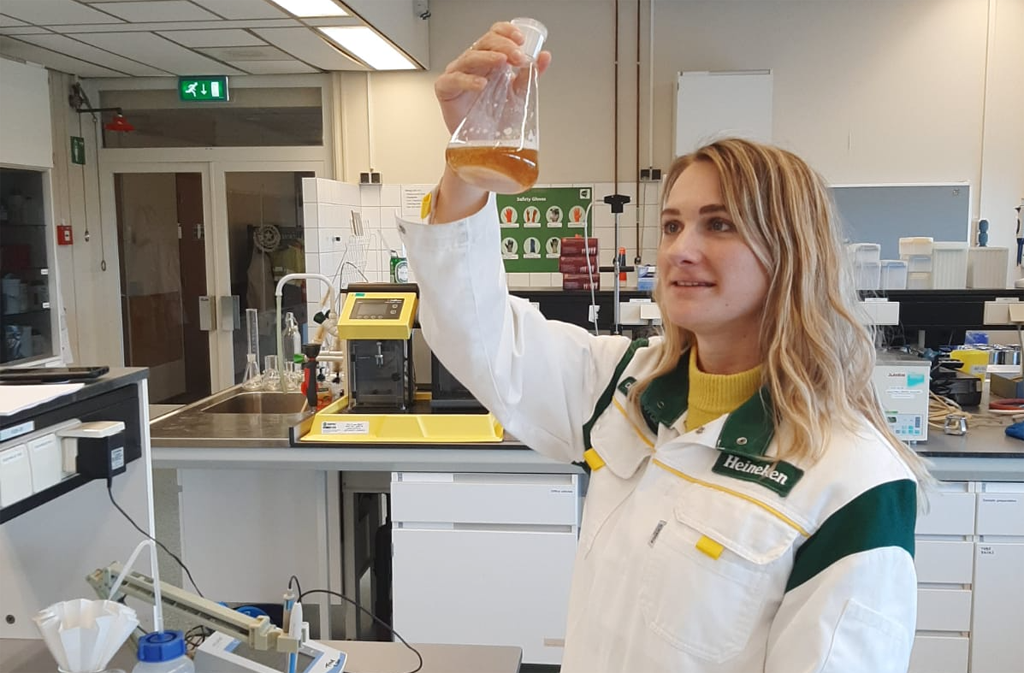The demand for alcohol free beer is rising, and not only in the ‘dry’ month of January. A method has now been developed to improve the flavour. Will it really work?
After her PhD research Deborah Gernat became researcher at the Heineken R&D lab. (Photo: Private collection)
“The taste of alcohol free beer is not always being experienced as optimal”, says Dr Marcel Ottens, purification expert at the Faculty of AS at TU Delft “so this is a really good way to improve the flavour.”
Under his supervision, bioprocess engineer Deborah Gernat has developed a new way to tailor the taste of alcohol free beer produced by “restricted fermentation.” The 16 person taste panel evaluated the beer as refreshing and clean. The fruity and bitter flavours emerged more clearly, while the tastes of grains, roasting and almonds had faded.
With her doctoral dissertation defence in April, Deborah Gernat has come full circle. When she was 18 she wanted to study brewing and beverage technology at the TU Berlin (in German), but decided that it would be more sensible to pursue a broader study. Her choice fell on biotechnology and she brewed at home as a hobby. After she graduated, she heard that Ottens had started working with Heineken and contacted him. She ended up in a Doctoral Programme, but one that had a clear goal that met her own: a better alcohol free beer.
The difficulty with the taste of alcohol free beer largely lies in the production process. The dark flavour often masks the refreshing aspects. Brewers talk about the ‘wort’ flavour of the brown boiled mashed barley released at the start of the brewing process. Fermentation does not only convert sugars into alcohol, but also changes the wort flavour into lighter, fruitier aromas. But with alcohol free beer, this hardly happens and there is no alcohol to retain the wort flavour.
The origin of these flavours (Strecker aldehydes) is well known and there is, in principle, a whole range of technologies that filter the substances from the mixture. The problem is the specificity: you want the pleasant hop flavour but do not want to lose either the colour or the proteins needed for a good head. On top of this, the process must be scalable to industrial level.
Gernat decided to try her luck with zeolites, extremely porous silica-aluminium binders with adjustable pore sizes that allow selective purification. One example of their uses is water softening in which calcium and magnesium are removed.
Gernat ordered zeolites with a pore diameter of the molecule size of the Strecker aldehydes. The aldehydes are also hydrophobic so can bind easily to other substances instead of moving among the water molecules. This combination significantly reduces the concentration of the substances that cause the grainy flavour. “Zeolites are very precise in separating according to size,” summarises Ottens. “This is the crux. It was also very satisfying to me that it works so well.”
Once the zeolite pores are filled with aldehydes, the material is saturated and does not take up any more flavours. The zeolites, packaged as either a grey block or powder, then needs to be replaced or recycled. “You can regenerate zeolites in high temperatures,” says Ottens, “but it is energy intensive. You need to weigh up the costs against the purchase price of new material. Deborah did this in her last chapter and has come to the conclusion that it makes economic sense to reuse the zeolites.”
What this means is that Gernat has developed an effective filter for the grainy flavour of alcohol free beer without the side effects. The method can be scaled up well and can be sped up by using smaller grain sizes. The crucial question is whether Heineken, who is funding the research, will also use the technology.
Heineken’s press officer announced that it cannot answer the question as the use of particular technologies is seen as confidential. Ottens, Gernat’s promotor, is less reserved. “The adsorbents are not that expensive, there is a high selectivity for these flavours and the technology can be scaled up easily. I see that it will be used in the future. But that is my prediction and it’s not up to me.”
And Gernat? After her PhD research, she was hired as a researcher at Heineken’s R&D department where she will continue her research into alcohol free beer.
- Deborah Gernat will defend her doctoral thesis entitled ‘Tailoring the aroma of alcohol-free beer’ on 9 April 2021 with Dr Marcel Ottens and Prof. Luuk van der Wielen of the Faculty of AS.
Do you have a question or comment about this article?
j.w.wassink@tudelft.nl


Comments are closed.